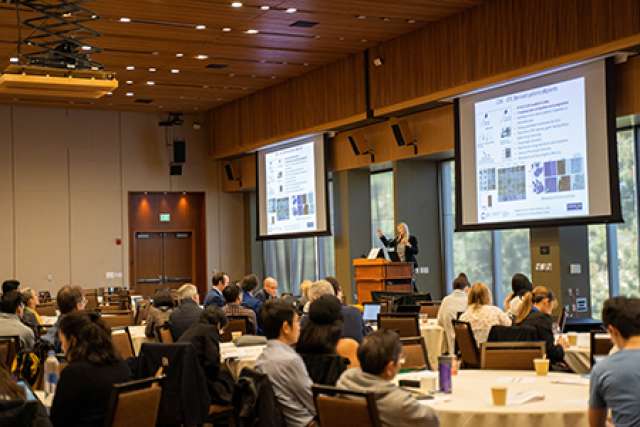Precision medicine has been a major priority for UCLA Health, underscored by the 2016 launch of the Institute for Precision Health at UCLA.
That continuing effort was highlighted by the inaugural California Precision Health Summit focused on cancer evolution held at UCLA on February 6 at Carnesale Commons. The all-day summit included presentations by top researchers in precision medicine from UCLA Health, UCLA's Jonsson Comprehensive Cancer Center and from leading research institutes at Stanford University, the United Kingdom's Francis Crick Institute and CURK Manchester Institute at the University of Manchester.
The aim of precision health is to revolutionize health prevention and the treatment of disease by better predicting which people may be susceptible to certain illnesses and finding treatments that are tailored more closely to their individual needs. The field involves the study of lifestyle, environment and genetic factors that provide insights into the health or illness of individuals or certain groups.
"The inaugural California Precision Health Summit was timed to coincide with the results from the largest cancer genomics consortia in the world, the ICGC/TCGA Pan-Cancer Analysis of Whole Genomes," says Paul Boutros, PhD, summit organizer and director of the UCLA Jonsson Comprehensive Cancer Center's Cancer Data Science program and associate director of cancer informatics for the Institute for Precision Health.
Global precision health experts
Speakers at the summit included Peter Van Loo, PhD, and Charles Swanton, PhD, from the Francis Crick Institute; Caroline Dive, PhD, from the CURK Manchester Institute; and Christina Curtis, PhD, from Stanford University. UCLA experts included Thomas Graeber, PhD, a professor of molecular and medical pharmacology; Antoni Ribas, MD, PhD, a professor of medicine, surgery and molecular and medical pharmacology; Alice Soragni, PhD, an assistant professor of hematology-oncology; Bogdan Pasanuic, PhD, an associate professor of computational medicine, human genetics, and pathology and lab medicine; and Jasmine Zhou, PhD, a professor of pathology and lab medicine.
"The transformational value of precision health was clearly apparent at this gathering of the international leadership in the field," says Steven Dubinett, MD, associate vice chancellor for research at UCLA, senior associate dean for translational research at the David Geffen School of Medicine and director of the UCLA Clinical and Translational Science Institute. "These are the foundational discoveries that will enable the critical advances in cancer prevention and treatment."
The Institute for Precision Health is headed by Daniel Geschwind, MD, PhD, senior associate dean and associate vice chancellor of precision medicine in the UCLA Health System and David Geffen School of Medicine. Geschwind is also the Gordon and Virginia MacDonald Distinguished Chair in Human Genetics and a professor of neurology and psychiatry and biobehavioral sciences. The Institute's deputy director is Clara Lajonchere, PhD,
The summit was co-sponsored by the UCLA Institute for Precision Health, UCLA Clinical and Translational Science Institute and the UCLA Jonsson Comprehensive Cancer.
For more information, please contact UCLA Health media relations at 310-267-7022.



